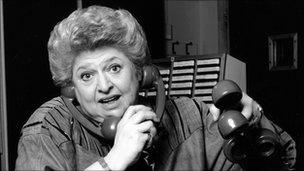Obituary: Claire Rayner
- Published

Claire Rayner became a household name in the 1980s
A radical broadcaster who strove for sweeping changes to government legislation, Claire Rayner remained a maternal figure, advising on problems from the medical to the mundane.
A trained nurse, Rayner, who has died aged 79, specialised in midwifery and paediatrics. While still studying, she met her husband Des and gave up her career, explaining that the concept of a married female student in those days was laughable.
Instead, in 1960, three years after their marriage, the birth of their first child ended her nursing career for good and she turned her hand to writing.
She eventually wrote nearly 100 books, on topics ranging from health care to crime fiction.
Writing for magazines and later appearing on television, Claire Rayner became most famous as an agony aunt, advising millions of readers on a whole range of emotional and practical problems.
But she came to resent this label.
After more than 40 years as a writer and campaigner on issues of public health, she lamented: "I would be sorry if they just called me an agony aunt. There was a bit more on my plate than that. It's like saying 'she ate potatoes'."
In 2001, Rayner's own ordeal with breast cancer brought her respect from an even wider audience, for her determination and humour.
Lifetime campaigner
When she had a double mastectomy, she reflected on her breasts, saying: "I am fond of the old things, I've had them a long time. But I'm not defined by them."
Rayner spent a lifetime trying to improve medical welfare. A president of the Patients' Association, she sat on the board of many a hospital trust and medical organisation.
She was also a patron of the Oxford Dementia Centre, and campaigned for years to gain free long-term care for the elderly.
In 1981 she was given the Freedom of the City of London and in 1996 was awarded an OBE for services in health and women's issues.
Street urchin
Rayner was given an honorary degree by the School of Healthcare at Oxford Brookes University in 2000
She was a staunch republican, opposing the monarchy and the House of Lords, calling them a benchmark of injustice and inequality.
And after having been a staunch Labour supporter for years, she left the party to join the Liberal Democrats, saying they were "the only party which really cares about older people".
At the time, she wrote after 50 years of supporting them.
A strong passion for social justice was no doubt instilled in the East End of London, where she was raised in a house with an outside toilet, a tin bath and shared with three other families.
She endured a harsh childhood, and claimed to have been abused by her "feckless" father, and in local streets where black eyes on children were a common sight.
But Rayner loved those streets, and was a typical urchin who did her share of pinching fruit from barrows.
She was also the president of the British Humanist Association, fitting for someone who said she had come to terms with the facts there are no fairies at the bottom of the garden, no god in the universe.
She said: "I don't need someone magical to have made it for me - it's there, and I drip with wonder at so much I see."
- Published12 October 2010